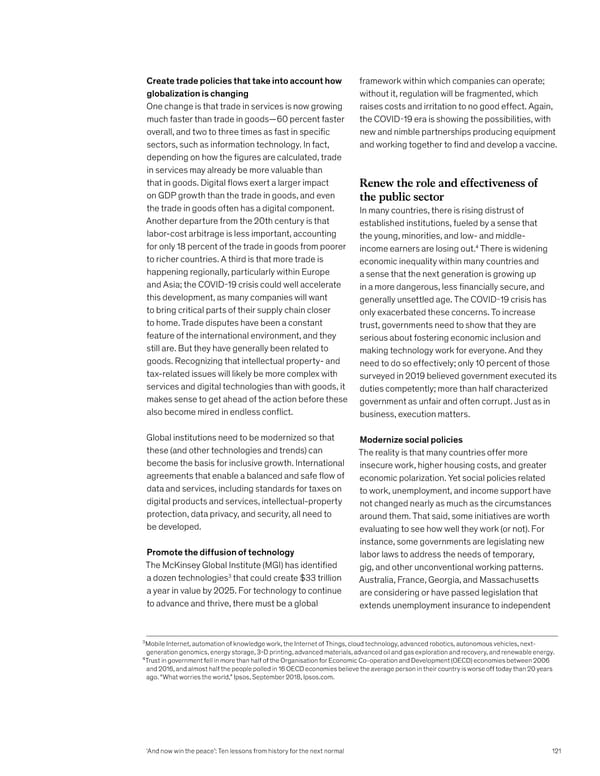Create trade policies that take into account how framework within which companies can operate; globalization is changing without it, regulation will be fragmented, which One change is that trade in services is now growing raises costs and irritation to no good effect. Again, much faster than trade in goods—60 percent faster the COVID-19 era is showing the possibilities, with overall, and two to three times as fast in specific new and nimble partnerships producing equipment sectors, such as information technology. In fact, and working together to find and develop a vaccine. depending on how the figures are calculated, trade in services may already be more valuable than that in goods. Digital flows exert a larger impact Renew the role and effectiveness of on GDP growth than the trade in goods, and even the public sector the trade in goods often has a digital component. In many countries, there is rising distrust of Another departure from the 20th century is that established institutions, fueled by a sense that labor-cost arbitrage is less important, accounting the young, minorities, and low- and middle- for only 18 percent of the trade in goods from poorer 4 income earners are losing out. There is widening to richer countries. A third is that more trade is economic inequality within many countries and happening regionally, particularly within Europe a sense that the next generation is growing up and Asia; the COVID-19 crisis could well accelerate in a more dangerous, less financially secure, and this development, as many companies will want generally unsettled age. The COVID-19 crisis has to bring critical parts of their supply chain closer only exacerbated these concerns. To increase to home. Trade disputes have been a constant trust, governments need to show that they are feature of the international environment, and they serious about fostering economic inclusion and still are. But they have generally been related to making technology work for everyone. And they goods. Recognizing that intellectual property- and need to do so effectively; only 10 percent of those tax-related issues will likely be more complex with surveyed in 2019 believed government executed its services and digital technologies than with goods, it duties competently; more than half characterized makes sense to get ahead of the action before these government as unfair and often corrupt. Just as in also become mired in endless conflict. business, execution matters. Global institutions need to be modernized so that Modernize social policies these (and other technologies and trends) can The reality is that many countries offer more become the basis for inclusive growth. International insecure work, higher housing costs, and greater agreements that enable a balanced and safe flow of economic polarization. Yet social policies related data and services, including standards for taxes on to work, unemployment, and income support have digital products and services, intellectual-property not changed nearly as much as the circumstances protection, data privacy, and security, all need to around them. That said, some initiatives are worth be developed. evaluating to see how well they work (or not). For instance, some governments are legislating new Promote the diffusion of technology labor laws to address the needs of temporary, The McKinsey Global Institute (MGI) has identified gig, and other unconventional working patterns. a dozen technologies3 that could create $33 trillion Australia, France, Georgia, and Massachusetts a year in value by 2025. For technology to continue are considering or have passed legislation that to advance and thrive, there must be a global extends unemployment insurance to independent 3 Mobile Internet, automation of knowledge work, the Internet of Things, cloud technology, advanced robotics, autonomous vehicles, next- generation genomics, energy storage, 3-D printing, advanced materials, advanced oil and gas exploration and recovery, and renewable energy. 4 Trust in government fell in more than half of the Organisation for Economic Co-operation and Development (OECD) economies between 2006 and 2016, and almost half the people polled in 16 OECD economies believe the average person in their country is worse off today than 20 years ago. “What worries the world,” Ipsos, September 2018, Ipsos.com. ‘And now win the peace’: Ten lessons from history for the next normal 121
 What Now? Page 122 Page 124
What Now? Page 122 Page 124